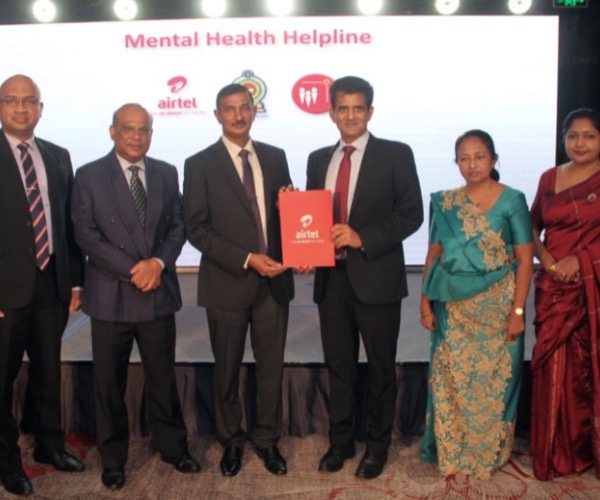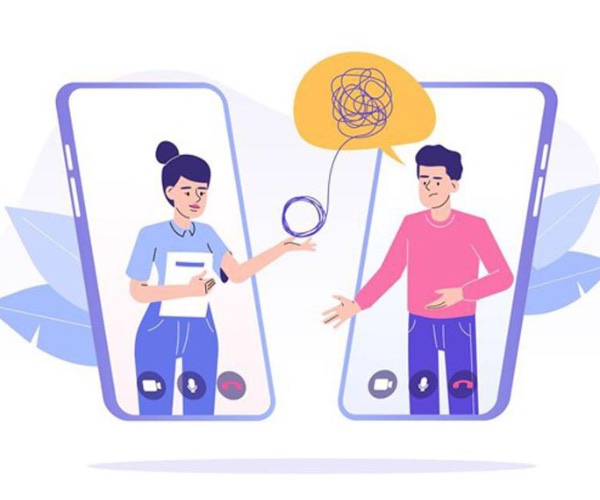
Sep 19 2022.
views 557The COVID-19 pandemic followed by the unprecedented economic crisis impacted the lives of Sri Lankans with feelings of uncertainty, taking a heavy toll on mental health. As means of improving access to mental health services, the National Institute of Mental Health (NIMH) introduced the 1926 Mental Health Helpline in 2018. Upon realising the fact that people are more comfortable texting than calling, Airtel Lanka joined hands with NIMH to introduce the country’s first text-based Mental Health helpline between the first and second lockdown periods. However, statistics have shown that the youth are highly vulnerable to committing suicide but they interact more on digital platforms. In its latest addition to this service, Airtel has now expanded the 1926 Mental Health Helpline to WhatsApp for the greater convenience of its users.

Local statistics indicate that around 3000 people take their own lives every year and that is 60% more than the number of people the country lost to COVID. This situation prevails in a global context as well. However, health professionals have identified that mental health issues are now more prevalent among the younger generation. As people were confined to their homes during the pandemic, people were disconnected from social circles and were afraid about their present and future which led to a dramatic spike in mental health issues in 2020. “This is when Airtel along with NIMH launched the country’s first text-based mental health helpline which was targeted at people who did not want to call up and talk about their issues,” said Ashish Chandra, CEO/MD, Airtel Lanka. Through this service, we have touched the lives of around 2000 people across the island. Since the launch of this chatline, we have saved 100 precious lives with the assistance that we have provided to users. Statistics have shown that around 80% of the people who access this helpline are below the age of 30. The world has evolved from 2020 to 2022 and people are now moving from voice to text to digital platforms.”
Upon realising the fact that more interactions now take place on digital platforms, Airtel Lanka has taken the initiative to expand the 1926 Mental Health Helpline to WhatsApp. “Nearly 80% of the population in the country have access to smartphones. Nine million citizens access social media on a daily basis and more than 50% of interactions with our customers have moved from voice-based services to text-based services. This shows that there’s a dramatic shift among people who interact via text and digital platforms.
Therefore we decided to expand this service to a digital platform, what is a better digital platform than WhatsApp? This platform gives you the opportunity to do a text-based interaction and if necessary, a video-based interaction with the customer thereby expanding the capability of the chatline that we are running on 1926. As such, anybody living across the world can now access the mental health WhatsApp chatline on 075 555 1926.
The services on the voice and text lines continue to be the way it is and these services are provided free-of-charge for all Airtel customers,” Chandra further said. Learned helplessness is a state of mind that occurs when a person experiences a stressful situation repeatedly. They come to believe that they are unable to change or control this situation – so they do not try – even when opportunities for change become available. NIMH’s Senior Consultant Psychiatrist Dr Pushpa Ranasinghe attributed this state of mind to most Sri Lankan youth, especially following the first and second lockdowns at the height of the COVID-19 pandemic. “Even though we introduced the text-based Helpline we realised that there was a lack of young people connecting with us. People didn’t have control over the events that came about and they have started to withdraw.

People were depressed and they didn’t want to pick up their phones and talk about their issues. They didn’t want to communicate with others. But the youth are the future of this country and this is why we need to reach out to young people. We need to nurture feelings of empathy, increase self-esteem among people, challenge problematic social norms, improve stress management, enhance emotional regulation, promote compassion and help build relationships.”
“Adolescents prefer to chat because of the stigma and anonymity. They feel empowered to talk about sensitive issues on digital platforms rather than calling. This allows adolescents to engage in one-to-one conversations about their issues. The Airtel team then provided us with tabs to communicate with customers. Statistics indicate that 30% of the customers are between 10-19 years of age while 52% are between 20-29 years of age. Many females contact us and some don’t want to reveal their gender at all. We don’t force them to do that anyway. They can simply tell us their problems and we will help them resolve these issues,” she added.
Some of the issues raised by young callers include sexual issues as people don’t openly talk about them due to social and cultural taboos. “Some questions about pregnancy, sexually transmitted diseases; we get many text messages just after O/L exams and just before A/L results are being released. Sometimes we get a random text message where a user would say that he/she wants to kill himself/herself. We then start chatting with them and messaging would go on for 2-3 hours. We patiently await their replies and this is how our interventions are being done. We have 168 nurses trained for the call line and 20 nurses for messaging. The call line operates 24 hours and the chat line operates from 8.00am-4.00pm. I have requested my matron and director to check the possibility of training our nurses to be with users 24 hours. In addition, we have trained 250 volunteers working in mental health teams at call centres that have been set up in every district with assistance from the Ministry of Health,” Dr Ranasinghe said in conclusion while stressing the fact that there’s always hope for life and that NIMH teams are ready to assist anybody in need of emotional or social support.
Pics by Pradeep Dilrukshana
0 Comments